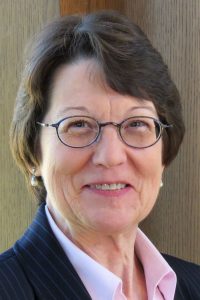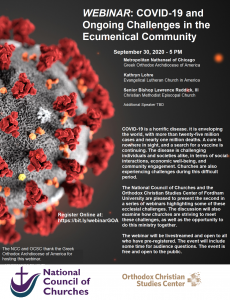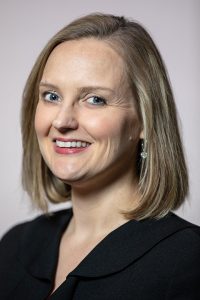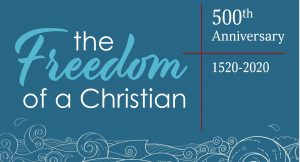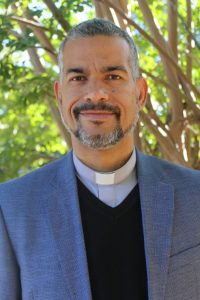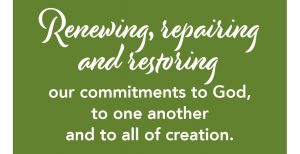By: Dcn. Mitzi Budde
On January 6, 2021, the Evangelical Lutheran Church in America and the Episcopal Church will celebrate twenty years of full communion. Full communion was established between the churches in the ecumenical agreement, Called to Common Mission, and inaugurated in 2001 at the Washington National Cathedral with a festival Epiphany Lutheran-Episcopal joint Eucharist. Called to Common Mission was the culmination of over thirty years of ecumenical dialogue leading to agreements on theology, Scripture, sacraments, and church polity.
What has this full communion agreement meant for our churches over these twenty years? We’ve worshipped together in joint celebrations and shared liturgies and developed a deep familiarity and appreciation for each other’s liturgies and confession of the faith. We’ve come to know the richness of our common foundation in the sacramental life of baptism and the Eucharist (even – or perhaps especially – in this season of COVID fasting from in-person worship and sacraments).
We have established full recognition of one another’s ordained ministries and the office of bishop. Episcopal priests are serving in ELCA congregations, and ELCA pastors are serving in Episcopal parishes. The permanent diaconate has found convergence and renewal in both churches.
Our bishops participate in each other’s installations/consecrations and confer with one another in local synods/dioceses. The Episcopal Diocese of West Missouri and the Central States Synod of the ELCA moved into shared offices in Kansas City, Missouri last year, the proximity creating new possibilities for partnership and collaboration. In the future, Episcopalians and ELCA Lutherans might build upon this model and establish diocesan/synodical partnerships with shared staff.
The Episcopal Church and the ELCA have established many joint ministry sites, as seen on the Lutheran-Episcopal Asset Map. Currently there are at least 73 Lutheran-Episcopal shared parishes across the country, such as Epiphany Lutheran-Episcopal in Valdez, Alaska which has been a joint congregation since 1978, pre-dating the full communion partnership by two decades. Our two churches are planting mission congregations together, such as Christ’s Beloved Community / Comunidad Amada De Cristo, an intercultural, bi-denominational, bilingual church start on the southside of Winston-Salem, North Carolina. We now have over 30 joint Lutheran-Episcopal campus ministries at colleges and universities and nearly 40 other forms of shared ministries, such as a summer camp and conference center, two social advocacy ministries, a school, and a border ministry.
Cruzando Fronteras was established in 2019 as a “new vision for border ministry” along the Arizona/Mexico border, sponsored by the Episcopal Diocese of Arizona and the Grand Canyon Synod of the ELCA. Their mission includes prayer and relational action along the border, advocacy for migrants and detainees, promotion of immigration reform, and Latino/Hispanic congregational development.
In Washington, D.C., ELCA Lutherans and Episcopalians work collaboratively on advocacy issues on Capitol Hill. Our two churches are working side-by-side to advocate on issues such as racial justice, immigration rights, environmental justice, and the abolition of human trafficking. The two churches jointly hosted an online faith-based advocacy training course, “Advocacy Tools for Loving Your Neighbor” in July 2020, where Episcopal Presiding Bishop Michael Curry and ELCA Presiding Bishop Elizabeth Eaton, together with advocacy leaders, explored issues needing the church’s advocacy and methods for making our collective voices heard.
Annually, the four presiding bishops in full communion in the U.S. and Canada prepare a shared devotional series for the four churches. The theme changes every year. For 2020, Presiding Bishop Michael Curry (TEC), Bishop Elizabeth A. Eaton (ELCA), Bishop Susan C. Johnson (the Evangelical Lutheran Church in Canada), and Archbishop Linda Nicholls (the Anglican Church of Canada) prepared a series of devotional bulletin inserts for the Season of Creation. These inserts invite our members to live out their vocation as stewards of creation through Scripture, hymns, advocacy and action. For the four churches, this is also an opportunity to strengthen relationships with one another. Together, they have claimed the name “Churches Beyond Borders” as they leverage the strength of bilateral partnerships that have come to serve as full communion partnerships among the four churches.
Having close ecumenical relationships already established means that the structures are in place to work together when the unexpected happens. The ELCA and the Episcopal Church have worked jointly on disaster relief for years in many parts of the country. When COVID-19 hit our nation, the two churches worked together with other ecumenical partners to craft ecumenical COVID guidelines for reopening parishes. The statement, Resuming Care-Filled Worship and Sacramental Life during a Pandemic, was developed by the Ecumenical Consultation on Protocols for Worship, Fellowship, and Sacraments, which was an interdisciplinary group of theologians, scientists, physicians, pastors, bishops, and practitioners from United Methodist, Evangelical Lutheran, Episcopal, Pan-Methodist, and Roman Catholic traditions, with the assistance of the Center for Disease Control.
A national Lutheran-Episcopal Coordinating Committee is charged with helping the two churches implement the full communion agreement and integrate it into our denominational mission and ministries. The Coordinating Committee’s charter defines its work as a ministry of encouragement: encouraging trust, cooperation, and mission; encouraging new and ongoing cooperative ministry work; encouraging communication of common mission work; encouraging prayer in support of full communion; encouraging communication of the work of this committee; and encouraging processes of decision-making. The Coordinating Committee’s current co-chairs are ELCA Bishop Donald Kreiss and Episcopal Bishop Douglas Sparks. Currently, the Coordinating Committee is currently updating the guidelines for clergy exchanges. The coordinating committee will also explore possibilities for establishing diaconal exchangeability.
Prayer for the church of Jesus Christ in its various expressions and for the members and ministries of the churches is the core call of ecumenical relationships. ELCA Presiding Bishop Elizabeth Eaton and Episcopal Presiding Bishop Michael Curry modelled this commitment of mutual prayer by inviting congregations and individuals to pray together through the COVID season, starting at Pentecost 2020. A Prayer for the Power of the Spirit Among the People of God was crafted by a team of Lutheran and Episcopal prayer leaders in light of the pandemic. This is a call to pray for and with one another, seeking spiritual renewal in these challenging times and revival for the common mission we share.
A Prayer for the Power of the Spirit among the People of God
God of all power and love, we give thanks for your unfailing presence and the hope you provide in times of uncertainty and loss.
Send your Holy Spirit to enkindle in us your holy fire.
Revive us to live as Christ’s body in the world:
a people who pray, worship, learn, break bread, share life, heal neighbors, bear good news, seek justice, rest and grow in the Spirit.
Wherever and however we gather,
unite us in common prayer and send us in common mission,
that we and the whole creation might be restored and renewed,
through Jesus Christ our Lord. Amen.
As ELCA Lutherans and Episcopalians celebrate 20 years of this flourishing full communion ecumenical relationship, may the Spirit inspire and empower us for many new creative partnerships in mission and ministry together in the years to come!
